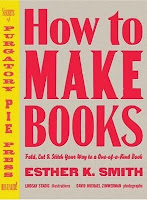E-Readers and Book Arts: A Peaceful Coexistence
 Being a library assistant and a general bibliophile, I have heard many lamentations concerning the rise of electronic reading devices: Kindles, Nooks, etc. (I myself own a Pandigital Novel). I don't believe that the development of new technology necessarily means the extinction of the older way. In some cases this has been true, of course: cassette tapes replaced by compact discs replaced by MP3s, etc. But books? This is a technology that has been around long enough to be removed from fad status, hasn't it? Hundreds of years, people. Medieval monks were making books!
Being a library assistant and a general bibliophile, I have heard many lamentations concerning the rise of electronic reading devices: Kindles, Nooks, etc. (I myself own a Pandigital Novel). I don't believe that the development of new technology necessarily means the extinction of the older way. In some cases this has been true, of course: cassette tapes replaced by compact discs replaced by MP3s, etc. But books? This is a technology that has been around long enough to be removed from fad status, hasn't it? Hundreds of years, people. Medieval monks were making books!Personally, my own lamentation has been the steady decrease in the quality of bookbinding in this last century. Working in a library, I see the newest James Patterson hardback come back after only two or three uses, and the binding is already falling apart. No, this is not because of patron abuse. I have seen it happen over and over. Sadly, this is the result of a cheap glue job and not one sewn page. Not that the quality of the content merits much more than this cheap mass-market production, mind you. But that's the beauty in this rise of the e-reader. My own hopeful prediction is that these popular books of convenience that are cheaply made and sold by the thousands (sometimes millions) will end up making the migration to mostly digital formatting--digital books being even more cost-effective than their poorly constructed physical counterparts.
This move, in my mind, will leave more room for the book arts market. Small presses dedicated to producing carefully crafted books that appeal to a more marginal literary audience (We're not snobs. Well... maybe a little...). Book artists and bookbinders, in general, recognize the importance of archival-quality materials: acid-free paper, acid-free adhesives, waxed linen thread. They are making objects that are meant to last longer than we are. At small and fine presses, books are made with the care of pieces of art because that is what they are. Not a meer means of accessing information. If that is what you are looking for, an e-reader device probably would be the most efficient tool. But books, at their most essential, are art objects and should not be made and treated as consumables.
I think it very probable that, in the long-term view of things, e-readers and well-made books can thrive side-by-side because essentially they serve different types of reading audiences. If it leads to greater care and attention in the making of books, I'm all for it.



Comments
Post a Comment